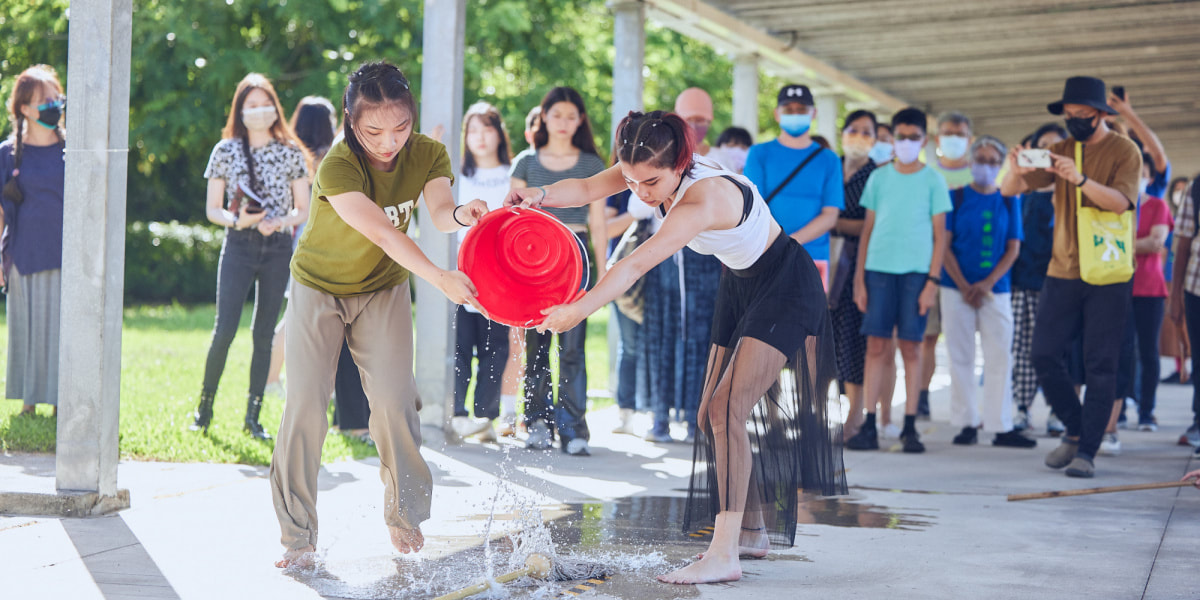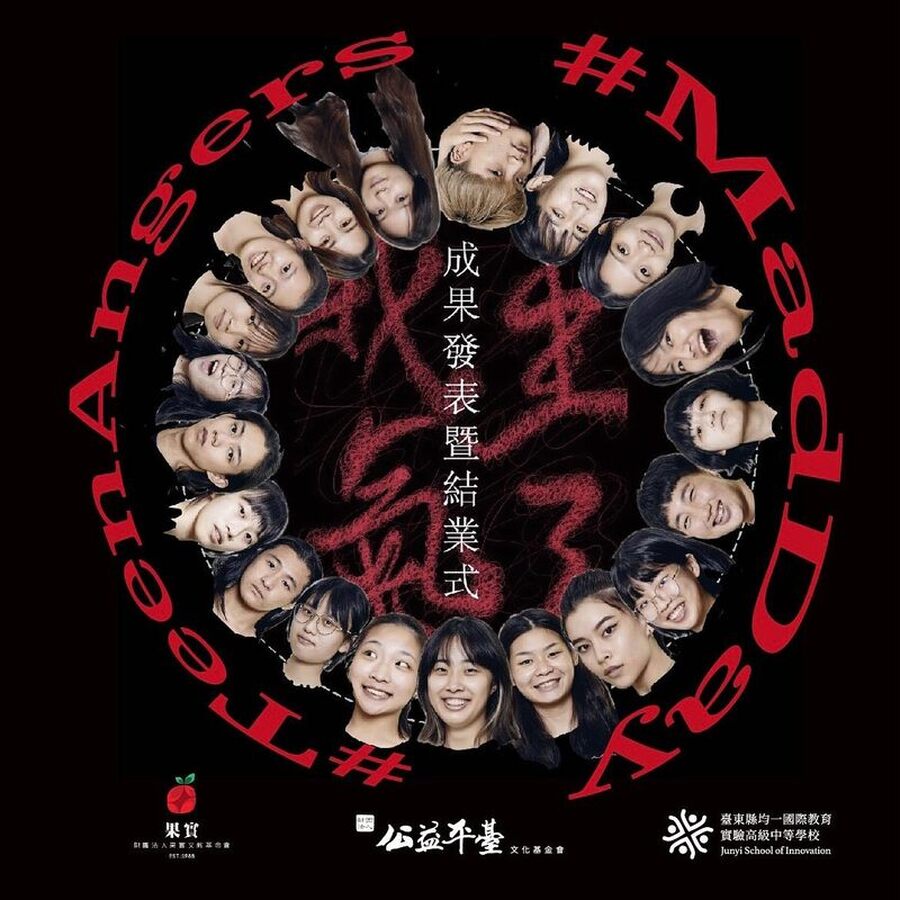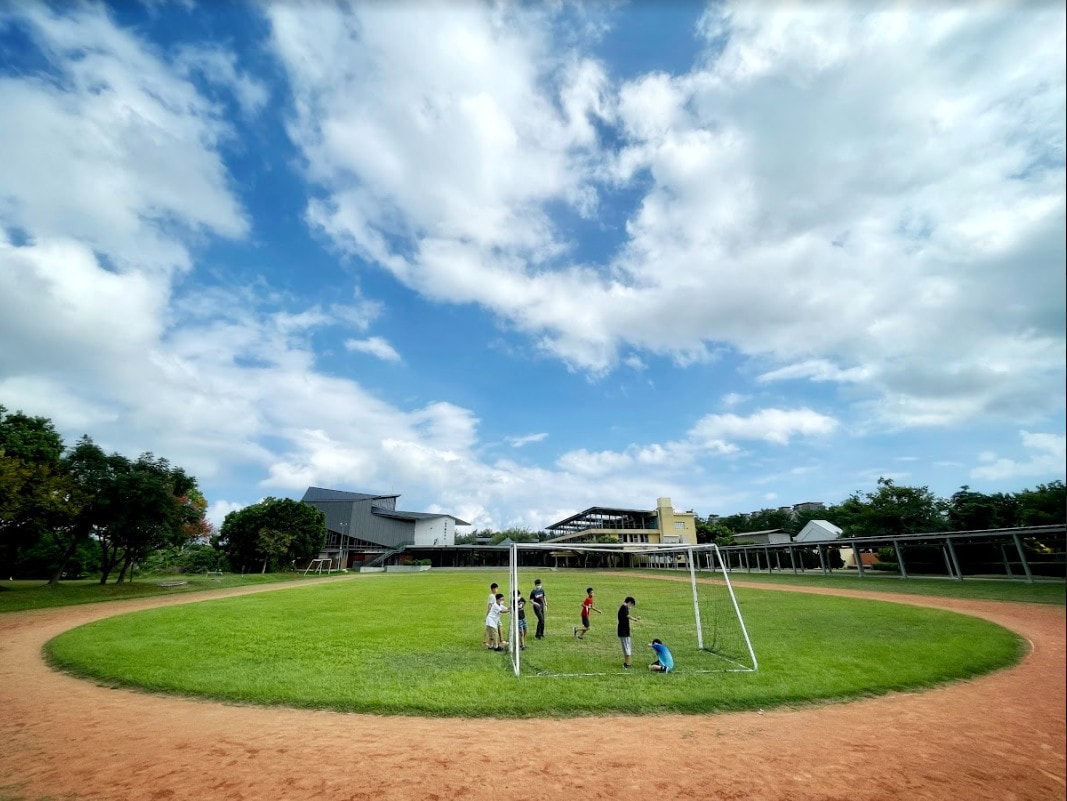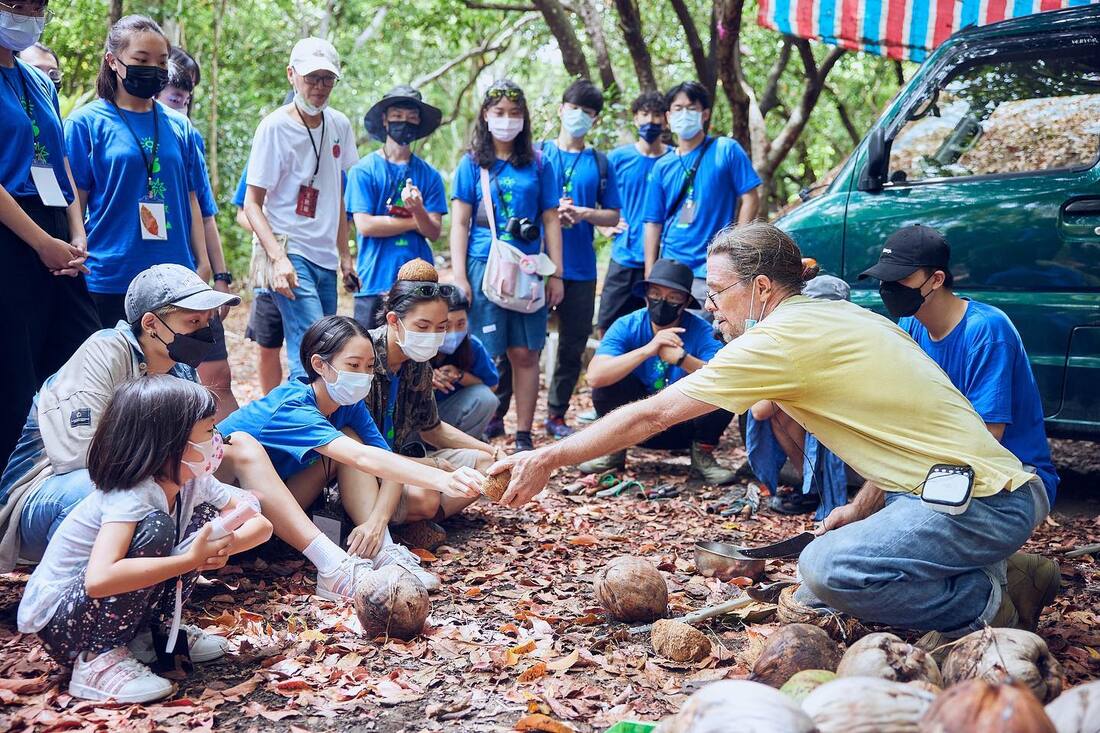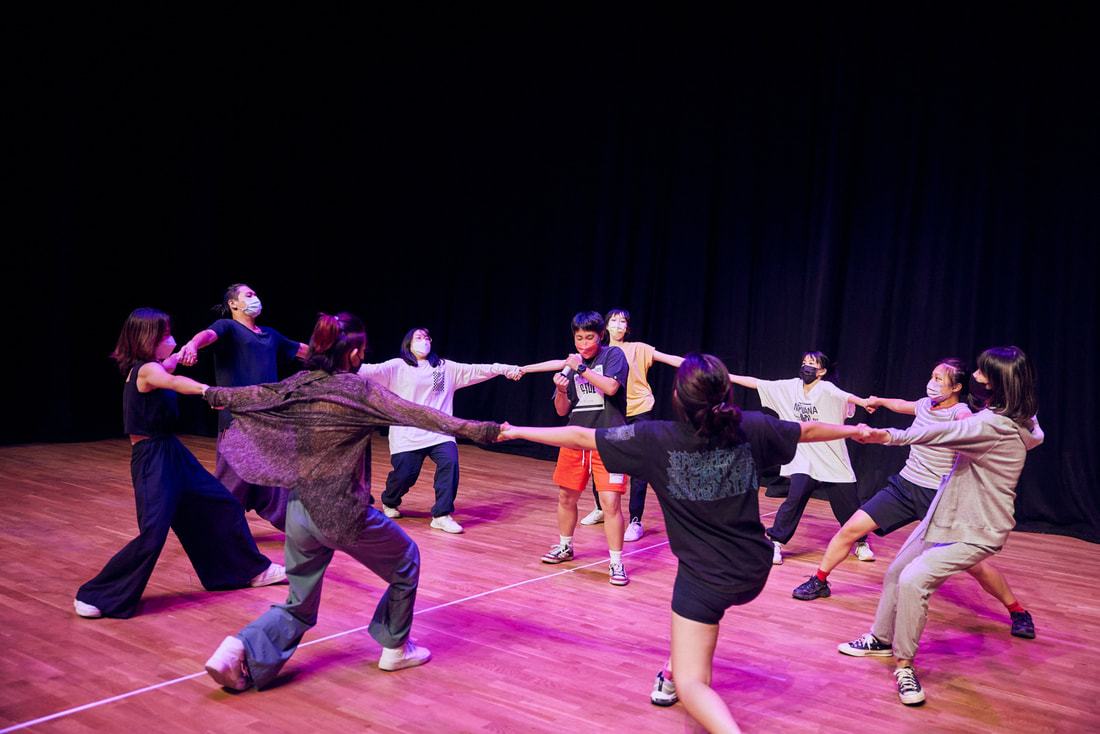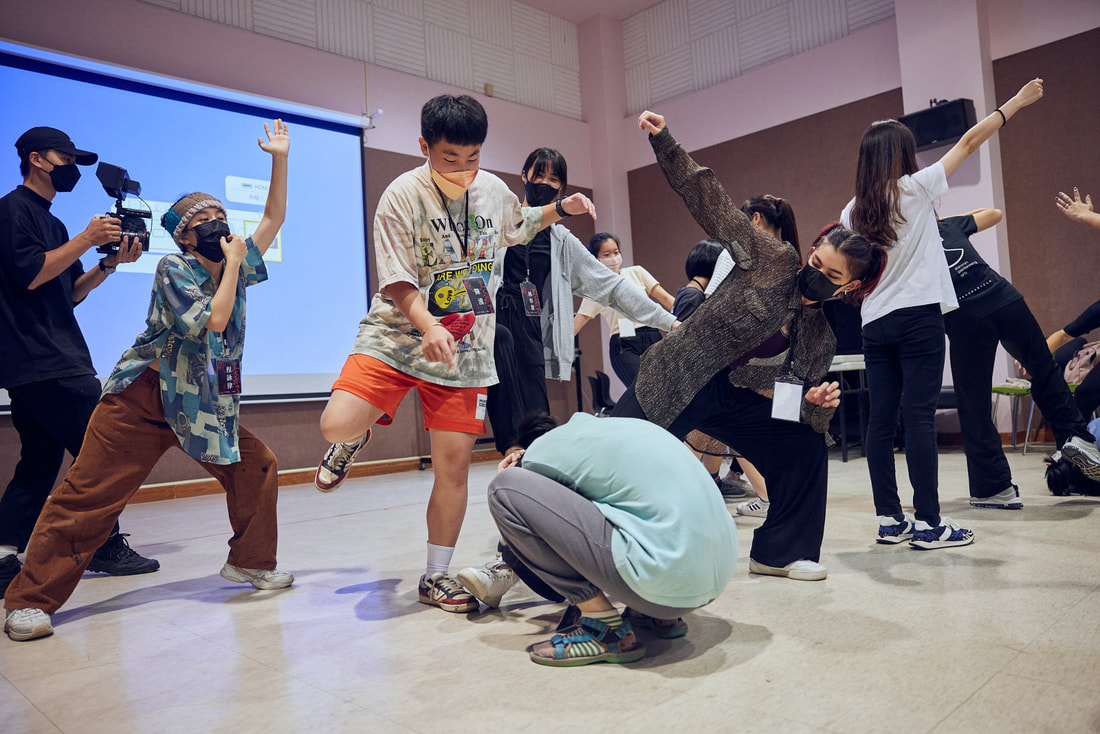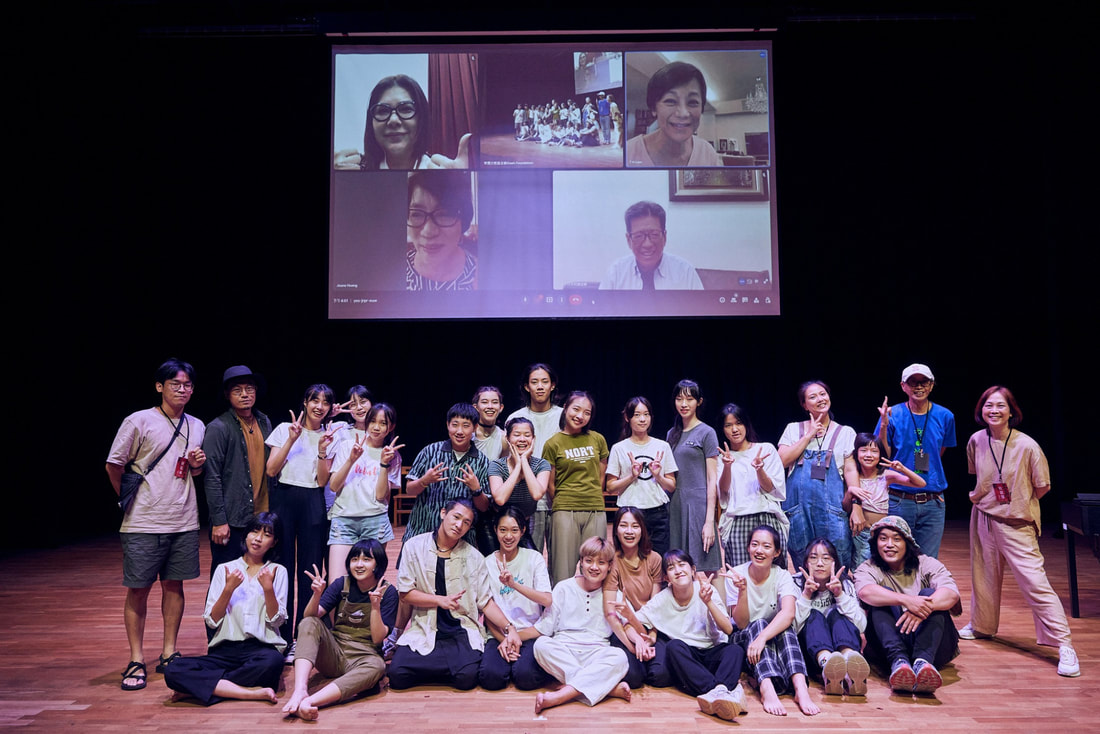Gosh Creative Arts Camp:
Understanding Self & Expression through Arts
“Gosh Foundation exists because of the seeds of hope spread across this land. What we do is inspire. Creativity is not something that can be taught, thus we provoke thinking through a different lens.” – Silvia Chang, Founder of Gosh Foundation and Film Director.
Gosh Creative Arts Camp: An unconventional summer camp
Art is made through observation, imagination, and creativity. It is a form of expression. 2022 marks the second time in which the Gosh Foundation and The Alliance Cultural Foundation (ACF) collaborates in the Gosh Creative Arts Camp held at Junyi School of Innovation. Founded in 2007, Gosh Foundation first collaborated with Taipei National University of the Arts. They combined innovative methods of mentoring and teaching which led to the creation of the unconventional summer camp. A now performing arts focused camp, it first started as an arts camp where participants learned to express through different mediums focusing on the theme set at the beginning of the camp. The theme one summer was “Tomato”. In addition to visiting a tomato farm to observe how the tomatoes grew, participants experienced an eight-course tomato themed Italian menu. Not having had the liberty to perform over Covid-19, the performance this year was held both indoors and outdoors utilizing the natural environment surrounding Junyi.
The camp, designed for senior high schoolers, intends to inspire youths particularly of this age group as Chang feels they are at a profound period of their lives where they are faced with considering their futures; they are also at an age of simplicity where they haven’t yet experienced societal pressures. Chang sets the theme for the camp each year. The 2022 theme was “I’m Angry”. The themes are meant to be topics that identify with youths, their everyday living, the environment, and emotions; the aim this year was to teach emotional calm. It was an interesting yet challenging theme for camp mentors to build a curriculum on.
Youths who grew up with the news, information, and communication at the palm of their hands tend to have a disconnect when it comes to real-life interactions. Camp mentors noticed an even greater disconnect post-pandemic; they noticed how quick participants were to respond to text messages yet lacked facial expression in real-life conversation. In the past, the majority of works submitted for the camp application were expressed through traditional mediums; in recent years, the majority of works submitted were in digital form. Covid-19 not only shifted the way of living but how people communicate and express through the arts.
Gosh Creative Arts Camp: An unconventional summer camp
Art is made through observation, imagination, and creativity. It is a form of expression. 2022 marks the second time in which the Gosh Foundation and The Alliance Cultural Foundation (ACF) collaborates in the Gosh Creative Arts Camp held at Junyi School of Innovation. Founded in 2007, Gosh Foundation first collaborated with Taipei National University of the Arts. They combined innovative methods of mentoring and teaching which led to the creation of the unconventional summer camp. A now performing arts focused camp, it first started as an arts camp where participants learned to express through different mediums focusing on the theme set at the beginning of the camp. The theme one summer was “Tomato”. In addition to visiting a tomato farm to observe how the tomatoes grew, participants experienced an eight-course tomato themed Italian menu. Not having had the liberty to perform over Covid-19, the performance this year was held both indoors and outdoors utilizing the natural environment surrounding Junyi.
The camp, designed for senior high schoolers, intends to inspire youths particularly of this age group as Chang feels they are at a profound period of their lives where they are faced with considering their futures; they are also at an age of simplicity where they haven’t yet experienced societal pressures. Chang sets the theme for the camp each year. The 2022 theme was “I’m Angry”. The themes are meant to be topics that identify with youths, their everyday living, the environment, and emotions; the aim this year was to teach emotional calm. It was an interesting yet challenging theme for camp mentors to build a curriculum on.
Youths who grew up with the news, information, and communication at the palm of their hands tend to have a disconnect when it comes to real-life interactions. Camp mentors noticed an even greater disconnect post-pandemic; they noticed how quick participants were to respond to text messages yet lacked facial expression in real-life conversation. In the past, the majority of works submitted for the camp application were expressed through traditional mediums; in recent years, the majority of works submitted were in digital form. Covid-19 not only shifted the way of living but how people communicate and express through the arts.
Inspiring the six senses
Lead Mentor Shihhue Tu and Camp Coordinator Angelika Wang were two of the camp’s key persons. How did they turn the theme, “I’m Angry”, into a curriculum that inspired participants to constructively express themselves through performing arts?
Wang, a Senior Curator of Film and Film Director who once curated the Taipei Golden Horse Film Festival and Taiwan International Children’s Film Festival, has a breadth of knowledge teaching videography as well as performing arts to children under 18. She coordinated the camp using the eyes of a curator. Wang asked, “When emotional boundaries are broken, how does anger show up? How do we understand and translate anger?” In addition to dance, music, drama, painting, and basic art lessons, Wang included lessons that taught emotional expression, ecosystems, mental health counselling to name a few. The lessons curated were meant to inspire the six senses of taste, smell, see, hear, touch, and proprioception.
Tu, Assistant Professor of Department of Theater Arts at the National Sun Yat-sen University, remembers clearly a moment from the first time collaborating with ACF at the Junyi campus in 2019. They were doing morning exercises and she was touched by the natural beauty that surrounds the campus. It inspired her to use the outdoor unrestricted space as their learning and performance ground for 2022 pushing participants to let go of the comfort of sitting in an enclosed space and have the freedom to explore nature. In the 2022 camp, participants could listen to cicadas for hours at a time sitting under a tree. The challenge of holding a performance outdoors is to be able to create a focal point in a large space for audience to feel connected to the performance.
Lead Mentor Shihhue Tu and Camp Coordinator Angelika Wang were two of the camp’s key persons. How did they turn the theme, “I’m Angry”, into a curriculum that inspired participants to constructively express themselves through performing arts?
Wang, a Senior Curator of Film and Film Director who once curated the Taipei Golden Horse Film Festival and Taiwan International Children’s Film Festival, has a breadth of knowledge teaching videography as well as performing arts to children under 18. She coordinated the camp using the eyes of a curator. Wang asked, “When emotional boundaries are broken, how does anger show up? How do we understand and translate anger?” In addition to dance, music, drama, painting, and basic art lessons, Wang included lessons that taught emotional expression, ecosystems, mental health counselling to name a few. The lessons curated were meant to inspire the six senses of taste, smell, see, hear, touch, and proprioception.
Tu, Assistant Professor of Department of Theater Arts at the National Sun Yat-sen University, remembers clearly a moment from the first time collaborating with ACF at the Junyi campus in 2019. They were doing morning exercises and she was touched by the natural beauty that surrounds the campus. It inspired her to use the outdoor unrestricted space as their learning and performance ground for 2022 pushing participants to let go of the comfort of sitting in an enclosed space and have the freedom to explore nature. In the 2022 camp, participants could listen to cicadas for hours at a time sitting under a tree. The challenge of holding a performance outdoors is to be able to create a focal point in a large space for audience to feel connected to the performance.
Learning begins with trust
“Before coming to the camp, participants didn’t know what to expect from the camp. They came in with a sense of uncertainty and fear, but by the end of the eight days, they openly shared their life experiences and stories. Several of them cried when sharing.” said Wang. The first lesson of a drama class usually involves trust building. Regardless of how times have changed, touch between two persons still carries a sense of discomfort in many Asian cultures. Instead of immediately teaching dance skills, Dancer and Camp Teacher Ming-Shen Ku had participants touch shoulder to shoulder, then elbow to elbow to feel the bodies and spirits of their peers. Ku also brought them to visit the Permaculture and Zudulan handmade soap shops. At the Zudulan handmade soap shop, mentors and participants learned to make soap by hand. Day and night throughout the camp, mentors and participants stayed close together to form deeper bonds.
“Before coming to the camp, participants didn’t know what to expect from the camp. They came in with a sense of uncertainty and fear, but by the end of the eight days, they openly shared their life experiences and stories. Several of them cried when sharing.” said Wang. The first lesson of a drama class usually involves trust building. Regardless of how times have changed, touch between two persons still carries a sense of discomfort in many Asian cultures. Instead of immediately teaching dance skills, Dancer and Camp Teacher Ming-Shen Ku had participants touch shoulder to shoulder, then elbow to elbow to feel the bodies and spirits of their peers. Ku also brought them to visit the Permaculture and Zudulan handmade soap shops. At the Zudulan handmade soap shop, mentors and participants learned to make soap by hand. Day and night throughout the camp, mentors and participants stayed close together to form deeper bonds.
Compassion
Art is created through compassion, and to have compassion is to have empathy. It is not only looking through the lens of self but others. In a class that teaches compassion, praise was discussed as an easy way to connect, yet could also create unease if expressed mindlessly.
The class discussed body language, tonality, energy, and emotion as the unspoken elements of communication. Respectful communication may become challenging at the end of a long work or school day. If self-awareness or compassion isn’t present, conflict may arise. One example given was how parents should try and see through the eyes of their child reflecting on their own childhoods. Wang said, “Reflection of the past is a welcomed practice in drama. It brings us back to the situation of our youth which creates empathy towards our child; in this case, instead of a top-down conversation, parents will likely respond more empathetically. When the tone of the parent changes, the child, who is hyper-sensitive to the parent, immediately responds creating possibility for change.”
Art is created through compassion, and to have compassion is to have empathy. It is not only looking through the lens of self but others. In a class that teaches compassion, praise was discussed as an easy way to connect, yet could also create unease if expressed mindlessly.
The class discussed body language, tonality, energy, and emotion as the unspoken elements of communication. Respectful communication may become challenging at the end of a long work or school day. If self-awareness or compassion isn’t present, conflict may arise. One example given was how parents should try and see through the eyes of their child reflecting on their own childhoods. Wang said, “Reflection of the past is a welcomed practice in drama. It brings us back to the situation of our youth which creates empathy towards our child; in this case, instead of a top-down conversation, parents will likely respond more empathetically. When the tone of the parent changes, the child, who is hyper-sensitive to the parent, immediately responds creating possibility for change.”
Habits
When Tu was asked how best to include art as a form of communication in a home setting, Tu responded, “Everyone should learn performing arts!” To teach and to nurture are two things. Tu noticed an increase in the lack of good habits and consideration post-pandemic. She believes the participants were likely over cared for at home over the pandemic. At the camp, they had the opportunity to form habits of life and co-exist with their peers.
At the final performance, some parents witnessed the talents their child had in performing arts. They expressed their worry that pursuing the arts may not provide a steady income for their child. Mentors and teachers keenly advocated nurturing participants’ talents and interests.
When Tu was asked how best to include art as a form of communication in a home setting, Tu responded, “Everyone should learn performing arts!” To teach and to nurture are two things. Tu noticed an increase in the lack of good habits and consideration post-pandemic. She believes the participants were likely over cared for at home over the pandemic. At the camp, they had the opportunity to form habits of life and co-exist with their peers.
At the final performance, some parents witnessed the talents their child had in performing arts. They expressed their worry that pursuing the arts may not provide a steady income for their child. Mentors and teachers keenly advocated nurturing participants’ talents and interests.
Personalization
Unlike other classes, personalization in performing arts classes is common. It is particularly imperative for teachers to get to know and understand each child to personalize their learning. One example is teachers will encourage outspoken children to initiate demonstration, and encourage shy children to overcome their fear of making mistakes.
Tu said, “It is not possible to perform well the first time you step on stage, there will be room for improvement, but when you step on stage, when you get to understand fear and frustration and step back into real-life, you’ll be a stronger person.” When a child steps forward even a small step, praise is encouraged. In performing arts classes, it’s important to let children learn about themselves, at the same time, they can help each other achieve their goals. One student said, “When we put all of our ideas together in a short time, the loss of some ideas is unavoidable, but in these situations the result is usually surprising.”
Unlike other classes, personalization in performing arts classes is common. It is particularly imperative for teachers to get to know and understand each child to personalize their learning. One example is teachers will encourage outspoken children to initiate demonstration, and encourage shy children to overcome their fear of making mistakes.
Tu said, “It is not possible to perform well the first time you step on stage, there will be room for improvement, but when you step on stage, when you get to understand fear and frustration and step back into real-life, you’ll be a stronger person.” When a child steps forward even a small step, praise is encouraged. In performing arts classes, it’s important to let children learn about themselves, at the same time, they can help each other achieve their goals. One student said, “When we put all of our ideas together in a short time, the loss of some ideas is unavoidable, but in these situations the result is usually surprising.”
Art is meant to be in our lives
Founder of Lanlin Theatre Troupe and Doctor of Educational Psychology Jing-Jyi Wu said, “Everyone should believe that they have the ability to create.” Wu believes that everyone is a story, and through writing, painting, photography, sketch, or colour each individual can express their own life stories. Gosh Foundation was founded in hopes to inspire self-awareness and seeing the world through a different lens. At Junyi, participants tidied up and followed recycling directions, it gave them a chance to learn basic life habits.
Tu believes that creativity is separate from artistic talent. At the camp, teachers learn with participants. Change doesn’t happen overnight, and just as Gosh Foundation’s future, the futures of the participants are unknown. Parents should allow children the space to grow without over protection. Tu remembers seeing a past participant, who found passion in performing arts from the camp, speak in Kaohsiung. To her, this is the most rewarding feedback.
Tu reflects being a resident artist in Australia. When she visited Uluru, she was deeply touched by the spirit of the rock, but not long after leaving the feeling had faded. She feels a similar sentiment for the camp, seeing the eyes of every participant leave brightly after eight days knowing that after they leave, the brightness will fade yet transform into a memory that is deeply engrained.
Founder of Lanlin Theatre Troupe and Doctor of Educational Psychology Jing-Jyi Wu said, “Everyone should believe that they have the ability to create.” Wu believes that everyone is a story, and through writing, painting, photography, sketch, or colour each individual can express their own life stories. Gosh Foundation was founded in hopes to inspire self-awareness and seeing the world through a different lens. At Junyi, participants tidied up and followed recycling directions, it gave them a chance to learn basic life habits.
Tu believes that creativity is separate from artistic talent. At the camp, teachers learn with participants. Change doesn’t happen overnight, and just as Gosh Foundation’s future, the futures of the participants are unknown. Parents should allow children the space to grow without over protection. Tu remembers seeing a past participant, who found passion in performing arts from the camp, speak in Kaohsiung. To her, this is the most rewarding feedback.
Tu reflects being a resident artist in Australia. When she visited Uluru, she was deeply touched by the spirit of the rock, but not long after leaving the feeling had faded. She feels a similar sentiment for the camp, seeing the eyes of every participant leave brightly after eight days knowing that after they leave, the brightness will fade yet transform into a memory that is deeply engrained.

